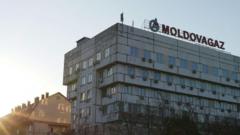Moldova is on the brink of a significant energy crisis following the cessation of Russian gas supplies that passed through Ukraine on New Year's Day. This interruption is being characterized by Kyiv as a pivotal moment, as the refusal to extend the transit agreement with Gazprom has starved the Russian war effort in Ukraine of vital funding. However, the repercussions are being felt most acutely by neighboring Moldova, which struggles with its energy supply needs.
In the separatist region of Transnistria, which is aligned with Moscow, New Year's Day marked the start of a chilling reality where only hospitals and critical infrastructure are receiving heat. Local resident Dmitry shared his discomfort over the lack of warm water and heating in his home. With gas pressure already low, the enclave faces stark heating challenges. Transnistria remains dependent on Russian gas, which historically flowed unencumbered, but the recent cut off in supply has left many residents anxious as they brace for colder temperatures.
Amidst the turmoil, Transnistria's government is taking steps to address the immediate heating crisis by setting up designated 'heating points' and providing resources for those in need. Still, many families have been advised to gather in single rooms due to dwindling resources. Blackouts loom on the horizon, particularly as the local power plant, which has relied on Russian gas, shifts to coal as its primary fuel source—a temporary solution expected to last only 50 days. This fuels concerns for the entire Moldovan nation, where the majority of electricity is derived from the same plant.
The Moldovan government, based in Chisinau, insists it has sufficient gas reserves to maintain warmth until spring, but the switch to European electricity sources poses an economic burden. Heightened energy costs have led to the declaration of a state of emergency, requiring businesses and citizens to cut back on consumption against a backdrop of potential power outages.
The energy crisis extending from Moldova's halt of gas supply from Ukraine is felt across Europe, impacting countries like Slovakia and Hungary, which have been slow to shift away from Russian energy reliance. While these nations may strain under increased costs for alternative supplies, Moldova faces a dual challenge of not only economic implications but also the specter of political instability—the result of an economy already reeling from various effects of the ongoing conflict in Ukraine.
From the perspective of the Moldovan government, recent events are framed not merely as an energy crisis but as an orchestrated security crisis employed by Russia to destabilize the country’s economy and society. The foreign policy adviser to Moldova's president, Olga Rosca, underscores this view by citing potential political maneuvering leading up to parliamentary elections slated for 2025.
Relations between Moldova and Russia have been strained, with Moldova moving toward EU integration in a bid to escape Moscow's influence. The re-election of President Maia Sandu was met with dissent from Russia, particularly aimed at undermining her legitimacy. Previous allegations made by the Russian intelligence agency accused her of intending to use force against Transnistria, increasing tensions.
Analysts also see the Kremlin leveraging the situation to exploit Moldova's vulnerabilities. With rising electricity prices creating public dissent, pressure mounts on the government from citizens struggling to maintain their livelihoods. If Transnistria opts for alternative gas supplies, the resulting economic strain could be debilitating for local populations already experiencing poverty.
As Moldova navigates these intricate challenges, the unfolding humanitarian situation in Transnistria presents an urgent need for dialogue and solutions—one that balances energy needs with political realities against a backdrop of potential external influence, all while residents like Dmitry face an uncertain winter.


















